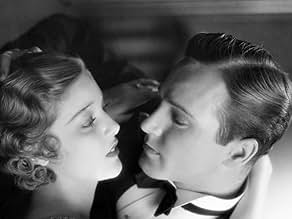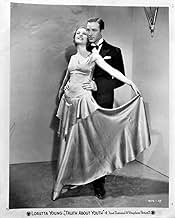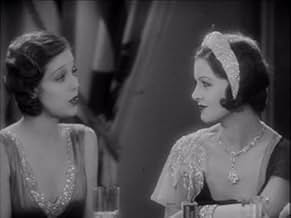Adicionar um enredo no seu idiomaRichard Carewe has raised his deceased friend's son from childhood with the help of his housekeeper and her beautiful daughter Phyllis. He arranges a marriage between the lad and Phyllis, bu... Ler tudoRichard Carewe has raised his deceased friend's son from childhood with the help of his housekeeper and her beautiful daughter Phyllis. He arranges a marriage between the lad and Phyllis, but the rascal impulsively marries a notorious nightclub singer known as "The Firefly." The ... Ler tudoRichard Carewe has raised his deceased friend's son from childhood with the help of his housekeeper and her beautiful daughter Phyllis. He arranges a marriage between the lad and Phyllis, but the rascal impulsively marries a notorious nightclub singer known as "The Firefly." The femme fatale dumps the boy when she discovers that he has no money, but by then Phyllis re... Ler tudo
- Direção
- Roteiristas
- Artistas
- Jim - Kara's Boyfriend
- (não creditado)
- Headwaiter
- (não creditado)
- Nightclub Patron
- (não creditado)
- Babette - Kara's Maid
- (não creditado)
- Nightclub Patron
- (não creditado)
- Nightclub Patron
- (não creditado)
- Hal - Dane's Pal
- (não creditado)
- Jim Greene
- (não creditado)
- Night Club Patron
- (não creditado)
- Cherry - Blonde Party Girl
- (não creditado)
- Man at Wedding License Bureau
- (não creditado)
- Direção
- Roteiristas
- Elenco e equipe completos
- Produção, bilheteria e muito mais no IMDbPro
Avaliações em destaque
It's a 1930 movie, so it's a little stiff and stagy, in production and acting. Loy is wonderful, like a breath of fresh air whenever she's around, glittery and sexy and dangerous. Manners is his usual rather awkward self (when he's staring with lust at Loy, he looks rather like Harpo Marx during his drunk scene in THE COCOANUTS) but he has the leading man looks needed for the part. Young is not as good as she would be in later movies; both she and Tearle are rather stiff. The characters could be fleshed out a bit more; all the exposition is crammed into a long dialogue scene in the first ten minutes of the movie. I would particularly recommend this to Loy fans-it's always fun seeing her as a kind of femme fatal (as she was in several of her early films) and contrasting that image with her good-girl/wifely image later in her career.
Because this is an early talkie, the film comes off as rather wooden. Both Loy and Young are gorgeous, Loy as a vamp and Young as a sweet young thing. Both had those short hairdos with the tight wave so popular back then. Loy has the better role as a money-grubber, and she's great. The gown she wears in performance is a knockout - an actress could wear it to the Oscars today.
The men are just okay, with the exception of two of the guardians, J. Farrell McDonald and Harry Stubbs, who provide some humor.
Before she became Nora Charles, Loy was cast as a vamp, usually an exotic one, until a producer who knew her personally decided to mine her humor. "The Truth About Youth" is an excellent chance to see her in an early role.
This light piece of early sound Warner Brothers is between so many different worlds. It's between the roaring twenties and the Great Depression. The roaring twenties are over but the poverty of the 30s have not yet arrived. Thus you have a night club and act worthy of the roaring twenties. And nobody after the roaring twenties would have continually called a grown man "The Imp" (David Manners' character) versus his right name.
It's between two wars - the two world wars, and so you have a trio of men who appear to have had their friendship founded in the military - though they never come out and say so. The dead friend they continually refer to - heck, Conway Tearle's character has been raising his son for 15 years! - probably died in military service, thus the debt they feel and the reason all three consider themselves the lad's wards. It's far enough away from WWI at this point that one can speak of war somewhat romantically.
This film is also between the silent and sound eras. 1930 was actually the first full year of talking films, and the industry hadn't yet quite gotten down the art of doing sound film. Thus there is an over powering score that drowns out conversation in some parts, and there is absolutely no score in others to the point that I expect to hear crickets chirping.
Then there is their choice of stars during this transitional period. Of course, Loretta Young at 17 does a grand job and she had a career that straddled both the silent and sound eras. David Manners may be unfamiliar today, but he was the juvenile lead in practically every film made until 1936, when he suddenly retired. The odd bird in the cast has to be Conway Tearle in the lead as a man trying to save his ward , "the Imp" from a gold digging temptress (Myrna Loy). Tearle had a good voice, and in the early sound era that was enough to get you leads for a couple of years. Tearle had the good fortune to be the lead in Warner Brothers' biggest hit until Robin Hood in 1938, that being 1929's "Gold Diggers of Broadway". Unfortunately, physically, Tearle was so non descript that career criminals would have killed to look like him - He is just so neutral in his features that he is impossible to describe. Once more distinctive actors begin to arrive on the scene such as Cagney and Gable, Tearle was pretty much out of leading roles.
Finally let me say something about Myrna Loy. She plays here, as she often did at her time at Warner Brothers, the exotic temptress. In this case she is Kara, "The Firefly", the star of a nightclub act wo wants to marry David Manners' "the Imp" for his money which he doesn't happen to have.. She is spotlighted singing songs not written for her with a singing voice that is not hers either. I'm sure she was grateful to find a home at MGM where she spent a good part of her career playing normal people, gaining the slogan - "Myrna Loy, so nice to come home to".
The conflict begins when David Manners, pledged to marry Young, falls instead for nightclub performer Loy whose exotic, cynical, gold-digger comes as refreshing counterpoint to Young's homespun housekeeper's daughter. Loy lip syncs a couple of forgettable songs and dances passably & briefly, looking gorgeous at all times. Melodies of two better songs of the day, "Get Happy" and "Miss Wonderful," are played during nightclub scenes.
Young's line readings are smooth and natural, especially considering her age at the time. But they are, in fact, rattled off too smoothly to register the subtleties of thought that her character is experiencing, so that when she reaches certain conclusions late in the story, they seem arbitrary. Loy's best moment is an outburst of anger while in the arms of David Manners when she finds out he isn't quite the cash cow she thought he was, but the scene collapses when she hurls a vase at him, and misses by a mile. Manners himself is slightly less wooden than usual, but only slightly. He does manage to get a drunk scene half right.
A few inter-titles illustrate a lingering habit from the silent era, while underscoring in some dramatic scenes reminds us that even in 1930 pure unadulterated soundtrack hiss was not always the case.
To those who find the ending shocking, tut-tut. Surprising, maybe.
Você sabia?
- CuriosidadesMyrna Loy was actually a fully trained professional dancer, having studied with Ted Shawn (husband of modern dancer Ruth St. Denis and co-leader with her of the Denishawn company), but "The Truth About Youth" and Warners' all-star musical "The Show of Shows" were among the few movies in which she actually got to dance.
- Erros de gravaçãoDuring Kara's first number at the Firefly Club, she purses her lips and blows a kiss to someone in the audience. It is an obvious lip-sync as she is still heard singing while doing that.
- Citações
Phyllis Ericson: It's about time I began. What chance does a girl nowadays, if she doesn't do this and won't do that?
- ConexõesFeatured in Myrna Loy: So Nice to Come Home to (1990)
- Trilhas sonorasIn the Land of Let's Pretend
(uncredited)
Music by Harry Akst
Played during the opening credits
Also played when Phyllis is sitting with Dick and Kara at the Firefly
Also played when Phyllis and Dick are alone at the end
Principais escolhas
Detalhes
- Data de lançamento
- País de origem
- Idioma
- Também conhecido como
- When We Were Twenty-One
- Locações de filme
- Empresa de produção
- Consulte mais créditos da empresa na IMDbPro
Bilheteria
- Orçamento
- US$ 153.000 (estimativa)
- Tempo de duração
- 1 h 9 min(69 min)
- Cor

























